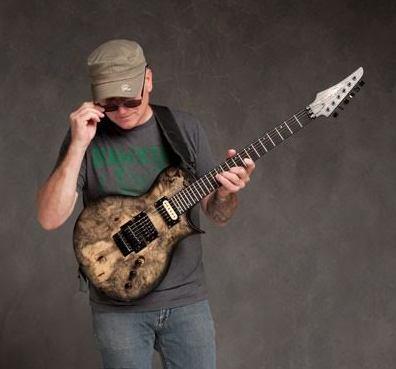On our home screens, we are looking at the tiny Baked Potato stage -- guitar-drums-bass setups but no humans, the wall behind splattered with the usual array of old posters. Almost no humans in the club, either. As background, we hear a heavy fusion recording from somebody covering Hendrix; good guitar tones.
Chris Poland walks across the frame past his Marshalls, disappears, walks back, walks across again, disappears again. After a few minutes, he and the band assume their positions and the house music stops.
Poland, whom one might take for an electrician nearing retirement, straps on his black Les Paul-style guitar. He's wearing a camo cap and a black T-shirt decorated with a camo American flag. Accoutered for battle? Wiry, headshaved Carlos Cruz sits behind his drums, as tall sitting down as Poland is standing up. Swashbucklin' Rob Pagliari, his creased face and graying shaggy hair retaining a substantial handsomeness quotient, tunes that big surfboard of a 6-string electric bass. Club manager Justin Randi introduces Ohm as a fantastic fusion band, the longtime essence of the Baked Potato's mission. He doesn't have to mention that Poland played on the first two Megadeth albums; everyone knows that. Poland: "Ready?" They are.
The internet sound is excellent; we can hear everything as well as if we were at the club, probably better. As always, we're struck by the variety of Ohm's music, from hard-charging metal to futuristic soundtrackery to funk to Celtic waltz, sometimes switching off time signatures. The band exudes a certain relaxed intensity, with Cruz pouring out torrents of cleanly executed complexity while Pagliari rocks and plucks counterpoint in a trance.
The visuals are much more varied than we'd expect -- cuts, dissolves, close-ups, from enough angles that there must have been a moving camera or at least four lenses. This offers us a special opportunity to observe Poland's fretwork, which he had to invent decades ago following severe damage to his left pinkie. The pinkie mostly dangles like a twig in the air, used only when Poland wants to hit some ultrahigh note. So his speed and fluidity derive from the way he slides his whole left hand quickly up and down; he makes more use of chromatic runs than any other guitarist, because the notes are conveniently close together. An involving show for geeks and headbangers alike.
What price originality? Most likely no guitarist has slammed his hand in a car door so he could sound like Chris Poland, or amputated his fingertips so he could sound like Tony Iommi, or burned digits off so he could sound like Django Reinhardt. But you can bet a few have thought about it.

